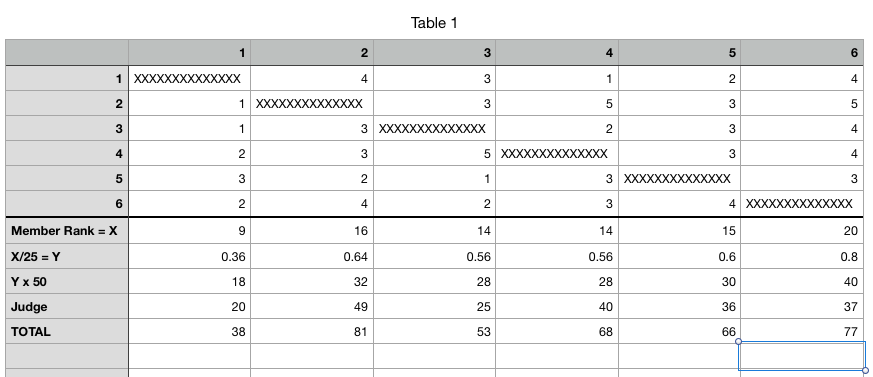Leaderboard
Popular Content
Showing content with the highest reputation on 05/30/2020 in all areas
-
Honestly they aren't that dance like but I wanted to do this. 😕 Feel free to leave feedback and comment. My internet is really slow. I should probably comment about something else but whatevs.1 point
-
1 point
-
I am personally leaning toward wanting the judges having a greater weight in the final scores, and the popular vote have having a smaller weight (but still counting for something). If people want the scoring system to be purely based on the popular vote, though, then I'd say there's not really any need to have judges at all -- maybe just an organizer? -- since their fellow contestants and other members would be, in effect, their judges. It would be a shame to ask anyone to go through all the work of being a judge for so many pieces if their detailed feedback would have little or no impact on the outcome of the competition as a whole. In other words, I'd like to be a judge (I've got a lot of other stuff I'm composing right now), but I think it would be kind of crazy to have a panel of judges who don't have any effect on the actual competition at all. I would also be happy to be the "organizer" if that is the direction we'd like to go.1 point
-
Again, I reserve the right to make the observation that I believe that this exchange (about your supposed ad hominem, which again, you fail to realize how it works DESPITE agreeing with me??!?) has been rather pointless. That you then go and extrapolate that into what you believe I'm implying (again with the assumptions, huh?) is not my problem. You really seem to like assuming and over-analyzing stuff, but it's not going to get you very far honestly if all it does is drag on something pointless like this. That's energy better spent elsewhere. INDEED. Well that's why I added the (maybe) next to your name. I think you're far more neutral and level-headed than ACO who outright just said: Which is a bunch of nonsense since he assumes you need to ACCEPT different philosophies, but you can certainly reject them instead. In fact, like I do! I'm not much of a "centrist", but rather I analyze each individual argument on its own merits regardless of they fall on whatever political compass is popular at the time of writing. Turns out I reject quite a lot of arguments from both the extreme "left" and extreme "right." And of course, I also think some positions from both sides are worth considering! Shocking, I know. No, I get what you're saying. I just think that the diversification and ease of access explains a lot of what seems to have "changed," rather than people themselves being fundamentally different in some way. You actually know those genres exist, which is far more than some guy in some small town in 1780 would be able to know about the world. It's clear that paradigms need to shift, then, as the world itself became incredibly connected in a way that has never happened before. IF you want to say anything is actually new, THAT is actually new, and the result and consequence of that is something we're still trying to understand. What may appear as "change" could be things that have always been there, but because that connectivity wasn't there, you couldn't perceive it and it didn't have as much of an impact. How? That's what I don't understand. Where's the connection there? It's a pointless accusation coming from someone who considers me "their enemy," right? I can also reach for my bag of "culture war-speak" and say most of your statements are dog-whistles, bla bla bla. But that's retarded, as is the context for your accusation: Shutting down a possible interpretation because I choose to use a different word to analyze it is -not- redefinition. I didn't take a word and twisted its meaning, I applied an entirely different word to a situation we BOTH saw was happening. If anything, I agreed with the phenomena, but I chose to view it through a different perspective. This is part of normal intelligent discourse and you may not agree with my POV on the subject. HOWEVER, what you're doing is attacking my perceived "method" of doing this, which is frankly laughable. SPECIALLY the "Orwellian trick" bit. Quinn said it brilliantly, so much so I will quote him AGAIN: In the end tho, what I'm for is very simple: Open exchange of ideas. I may think stuff you do is laughable, but much like Tonskald said: But I'm probably not as nice as he is about it.1 point
-
TO ALL INTERESTED APPLICANTS: This is a proposed version of the quick grading system for entrants to rate other entrants. Competitors will be required to rate a piece out of 5, the results of which will be tallied. Your total member score will be divided by the maximum total points you could have received (in the below case, 25), to determine a percentage. That percentage would then be multiplied by 50 (the maximum judge score to make the total /100), and would be added to the average judge score to determine your total score. Thoughts or concerns?1 point
-
SSC, have a look at your posts on this forum. You attempt to weaken an opponent's position by attacking his character pretty frequently. Calling my vantage point, and the vantage point of many others, a "strange thing to say," in order to strengthen your position is an example of ad hominem. Furthermore, requesting that I "do learn how to use ad hominem" in your very response implies that you think me ignorant and uninformed—a way of saying, "this guy doesn't know what he's talking about so you should all ignore him." You're using ad hominem to defend having not used ad hominem. But let's get one thing clear: I am not offended, and it's interesting that you assume I am. Your opinion is your opinion and you can state it whichever way you like. My goal is to understand the logic behind everyone's arguments (a term I'm using in its logical, not literal, sense), and an ad hominem argument is a logical fallacy. So you're saying that moral relativism exists, but not in a real, physical way that has affected society to any degree? There are a lot of assumptions made in your arguments; forgive me if I tease them out wrongly. First, you assume that societal standards and "our laws and civilization at large" are interchangeable terms. That wasn't my position, as I don't think society's standards are the same thing as the rules and laws upheld by our nation-states. Our civil laws may be influenced by society's mores/standards, but they are clearly not the same thing. However, I think they have changed. The decriminalization of cannabis is a great example, and the legalization of gay marriage another. Neither was legal in any country 60 years ago (to my knowledge). Both of these reflect a shift in the standards of society in the direction of moral relativism. Second, you claim that pop music is incredibly popular despite my position that artistic standards have changed. If moral relativism were a thing, then shared tastes in musical/artistic parameters wouldn't exist, or would at least depreciate such that no single genre could still be popular. So the assumption here is that moral relativism necessarily results in a shattering of commonalities and shared interests. I don't think that's the case. What it results in is an acceptance of a wider range of those parameters. The biochemical/neuronal basis of what hits the human "sweet spot" hasn't changed, but it can be reached in more varied media now. There are a lot more musical genres in existence today that didn't exist 60 years ago. Just a few that come to mind: Nu Gaze, Crunkcore, CDM, Ratchet. Hard for me to believe these would have been popular even 20 years ago. Third, based on your final paragraph, you assume that moral relativism means folks may harm each other if the offender feels morally justified in so doing, and that the role of the law is to keep this from happening. I agree with you. I don't know if history has any examples of a civilized society that has descended so far into moral relativism that "anything goes," as it seems humans have always possessed a sense of right from wrong. Expressing moral relativism in art, however, is basically harmless, but that position is relatively new in the grand scheme of things. In a society of moral absolutes, some things were not to be expressed in art, no matter if they brought harm to anyone: religious blasphemy, the sexual act, homosexuality... need I go on? Society's views on these subjects have become much more lax in the last 100 years, reflecting, once again, the taking hold of the modern idealogy of moral relativism. Finally, you assume that moral relativism necessitates a spectrum, and that because people fall sharply on either side of this spectrum, moral relativism must not exist. I think moral relativism and absolute morality are themselves the opposite ends of a spectrum. Those who belong to one side of the spectrum argue that nobody, not even a higher being, can call the moral shots, while those on the other side maintain that absolute morality does indeed exist and woe betide anyone who fails it. Thus, my position is that this spectrum is further evidence for moral relativism, rather than evidence against it.1 point
-
Saying it's a "strange thing to say," means, literally, that I think it's a strange thing to say. It's not an argument, it's an observation! It does not mean that you're "abnormal." Remember, offense is taken, not given. Also, do learn how to use ad hominem, as I did no such thing. At all. I did not base any of my arguments on an attack on your person. IF you want to take my words as an attack, that's on you as that was not my intention. Jeesh. No, that's quite simply not the case. Moral relativism is overly present on the internet, perhaps, but in real life our laws and civilization at large does not stick to individualistic rules but rather by collective rules. This carries over into art as well, as the reason why "pop music" is so incredibly popular is due to a massive shared taste in a particular set of musical/artistic parameters. It flies totally in the face of relativism when pop music is still working with the same mechanisms it always has for years and years. This has roots in the fact that brains are, well, similar to a large extent and process music (language and syntax expectancy) in a very similar way, so "naturally" people tend to gravitate towards things that hit those sweet spots. Nothing relativistic about that, it's just straight out neuroscience (+ cognitive science.) A society can accept individual freedoms to an extent, which is something defined by the code of law and civil rights of each country. However, they have limits. Thing about art is, there is no real limit to artistic freedom because it's, well, pretty harmless. Unless of course you want to go do actual illegal things and say it's art, in which case I'm not sure how that would work philosophically, but the practical reality is that it'd be the "wrong thing to do." There's no moral ambiguity in general when it comes to many things, and people tend to fall sharply on either side of a spectrum. Think of it rather as a change in priorities, rather than lack of standards. Someone doing a painting with menstrual blood is kind of yuck, but it's harming nobody in the grand scheme of things. It really isn't. If someone would think they need to be sent to an insane asylum or have their careers ruined over this, then they need a new hobby. The priority is much rather to avoid pointless conflict, as this would be, than to persecute people for having wacky ideas that are at the end of the day harmless.1 point
-
Except for what you say about all of this is objectively false. I don't know specifically who you are, but "we" as in white western people, the people whose ancestors created the bulk of the art we're specifically talking about right now, are absolutely not more numerous in number than 200 years ago. Birth rates have been negative for decades now. We used to have 4 children per woman, now about 4 cats per woman. The population growth is only due to foreign immigration and they usually have above-replacement rates...though like I said, it affects everyone. East Asia, South America... The other aspect is, as I have pointed out in those surveys in those posts that Monarcheon deleted, as much as 80% of people agree that modern art and such, really sucks. The main thing here though, is that modern relativists control literally all of academia and political power. They are the people making the decisions and the ones "educating" all the future generations, and have been for the better part of 100 years now. I'd recommend everyone in this thread to read "The Decline and Fall of Western Art" by Brendan Heard, who has a master's degree in art. In it, he explains the history of all this modernist nonsense and how, during his studies, students who showed real artistic skill was berated to the point of tears for showing said artistic skill. This mirrors the experiences of most art students I know, and also my own experiences in college with their music programs. People who are going to get educations in the arts and architecture are not learning the kinds of skills and aesthetics of our ancestors. If you want to learn how to paint as well as the renaissance painters did, you will have to learn mostly on your own, because a lot of this stuff is just a couple pages on a text book now that are treated as things that "had their time" and we're "better™" now. In fact, great works of art are openly defaced by academia because they're "racist" and represent "colonialism", apparently. Abstract expressionism championed in their stead. https://edition.cnn.com/style/article/university-of-notre-dame-christopher-columbus-murals-trnd-style/index.html And as I said: No one goes to artschool wanting to paint like Kandinsky. They go because they want to become like the great painters of old. They are not getting this. Where I live, all the houses in this new(ish) bloc — I remember when they were built. If I wanted to build a half-timber house or something cool like that, I legally could not because the city planners are all modernists. The houses all had to be built with either stucco or siding, only a certain amount of brick on either sides of the garage, no more than about 3/4 meter high, and only certain colors allowed. So first off, it would not be even permitted to build a house that goes outside of those schematics. Even if it were, I could not find a construction company that could build something traditional around here because architects are not taught how to do it. Once again, old, ornamented buildings are delegated to being a part of architectural history that is now an irrelevant dinosaur. If there is a company out there who could build older, European houses in my area, they would specialized and charge tons of money. People in the media, academia and politics freaked out when Trump said he wants new government buildings in America to be built in the classical style, something which the Atlantic considers a "bizarre" desire and, of course, said was "fascist" https://www.theatlantic.com/ideas/archive/2020/02/trumps-plan-make-architecture-classical-again/606286/ There is also, once again, the matter that in the past, why were artists, musicians, etc. not competing against abstract nonsense? Because everyone knows it was garbage and not worthy of being integrated into the architecture, hung up in art galleries or played in concert halls. Bad bards and street musicians were booed off their makeshift stages and told to practice more. So to say to the effect that the standards haven't "really" plummeted is just so obviously not true — we're surrounded by the truth of our decline every day — that it's kind of comical. You were worried about "authoritarianism" to uphold standards. Except the reality is: There is an authoritarian suppression of them.1 point
-
I wasn't familiar with Alma Deutscher, so I (naturally) had to go look her up. Turns out she's only 14/15 years old! This, in my opinion, significantly weakens the argument that her concert was sold out at Carnegie Hall simply because she writes in the galant style. I daresay many of the concertgoers were enticed to go because of her prodigy and couldn't have cared less what style she writes in. Most likely, the concert was sold out based on a combination of those two factors, though nobody can really tell which was more influential. In terms of "writing for the masses," I think this is where modern classical music has really dimmed its future. What I find most interesting is that classical music concertgoing is considered an elitist activity, deemed fit only for certain demographics, social classes, and—in particular—the rich. As proof of this, most people highlight the cost of attending such events. But tickets to live sporting events or pop concerts are no less expensive—most are significantly more expensive—and many people regardless of demographic, social class, or economic status have attended these. So the obvious question is why the stigma of elitism? I think this has to do with the grave the "classical music industry" has dug for itself. Classical composers by and large haven't written for the masses for at least a century, nor has this been the thrust of the industry/artform. The new products (i.e., compositions) have catered almost exclusively to those who identify as musical elites, and, as a result, the artform has become most out of touch with the society that financially supports it. (Now, I'm not saying that all examples of art in an artform must appeal to the masses, but I am saying that some of it has to if it is to remain viable.) This has been propounded by three generations of academicians acting as gatekeepers to the industry, who have probably only succeeded in creating an echo chamber of sorts: the number of people qualified enough to deem a piece of music as "worthy" is getting smaller and less diverse. Since the new works pander to the elites, the average concertgoer must settle for "reruns of timeless classics" or be forced to sit through an hour or more of music he neither understands nor appreciates. And pay a lot of money for it. I'm not sure if this model is sustainable. Certainly, many of us can feel the crisis that faces classical music today, as more and more local symphony orchestras close their doors permanently due to lack of public interest and subsequent funding. Could classical music ever really outcompete the film or pop music industries? Probably not, but we've done ourselves no favors by continually narrowing the target audience. If classical music is to make a comeback, I think we have to include the general public once again. We have to increase access. We have to allow them a voice in this process—and that voice might be with their feet and their wallet, which I think we are roundly ignoring. Please, do not misunderstand me. Classical music is an amoral entity, and the course it has taken is neither morally good nor bad; it simply is. My argument has everything to do with public perception and nothing to do with the inherent value of various styles of classical music. The general public just might adore atonal music, for example, but their opinions were never solicited (or were ignored if they were proffered), and over time this has led to the impression that classical music was "beyond them," written only for enjoyment by the musical elites. The current point on this trajectory of classical music might be interesting and oh-so avant garde, but all of that will matter very little when nobody remains to perform it. We will have killed the beast by snubbing the hand that feeds us. Sorry for the long post. I understand how touchy this subject can be and decided it was best to fully explain my position. I'm not really concerned with the past of classical music but with its future in our society. Curious to read others' thoughts about this.1 point






